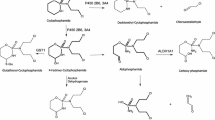Abstract
Immunosuppressive drugs are agents capable of suppressing the development of at least one type of immune responsein vivo at doses with minimal side-effects.
After an introduction in which different types of immune responses are briefly discussed, some characteristics regarding the mechanism of action of prednisolone, azathioprine, cylophosphamide and anti-lymphocyte serum (ALS) will be reviewed. Corticosteroids display mainly an anti-inflammatory effect. The immunosuppressive effect of azathioprine is questionable, cyclophosphamide influences the immune system itself and ALS suppresses fairly specific cellular immunity.
Similar content being viewed by others
References
General reading list
Bach JF. The mode of action of immunosuppressive agents. Amsterdam: North Holland Publishing Co., 1975.
Benacerraf B, Unanue ER. Textbook of Immunology. Baltimore-London: Williams and Wilkins, 1979.
Fudenberg HH, Stites DP, Caldwell JL, Wells JV. Basic and clinical Immunology. 4th ed. Los Altos: Lange Medical Publications, 1982.
Hobart MJ, McConnell I. The Immune System. A course on the molecular and cellular basis of immunity. 2nd ed. Oxford: Blackwell Scientific Publications, 1981.
General reading list
Cupps ThR, Fauci AS. Corticosteroid-mediated immunoregulation in man. Immunol Rev 1982;65:133–5.
Ten Berge RJM, Schellekens PThA, Surachno S, The TH, Ten Veen JH, Wilmink JM. The influence of therapy with azathioprine and prednisolone on the immune system of kidney-transplant recipients. Clin Immunol Immunopathol 1981;21:20–32.
Van Furth R, Gassmann AE, Diesselhoff-den Dulk MMC. The effect of azathioprine on the cell cycle of promonocytes and the production of monocytes in the bone marrow. J Exp Med 1975;141:531–46.
Ten Berge RJM, Schellekens PThA, Surachno S, The TH, Ten Veen JH, Wilmink JM. A longitudinal study on the effects of azathioprine and high doses of prednisone on the immune system of kidney transplant recipients. Clin Immunol Immunopathol 1982;24:33–46.
Ten Berge RJM, Schellekens PThA. A critical analysis of the use of azathioprine in clinical medicine. Neth J Med 1983;26:164–71.
Ten Berge RJM, Van Walbeek HK, Schellekens PThA. Evaluation of the immunosuppressive effects of cyclophosphamide in patients with multiple sclerosis. Clin Exp Immunol 1982;50:495–502.
Heyworth MF. Clinical experience with antilymphocyte serum. Immunol Rev 1982;65:79–97.
Cosimi AB. The clinical usefulness of antilymphocyte antibodies. Transpl Proc 1983;15:583–9.
White D. Cyclosporin-A. Clinical application and immunology. Clin Immunol Allergy 1983;3:287–304.
Author information
Authors and Affiliations
Rights and permissions
About this article
Cite this article
Schellekens, P.T.A., Ten Berge, R.J.M. The effects of immunosuppressive drugs on human immunocompetence. Pharmaceutisch Weekblad Scientific Edition 6, 32–38 (1984). https://doi.org/10.1007/BF01960197
Received:
Accepted:
Issue Date:
DOI: https://doi.org/10.1007/BF01960197




